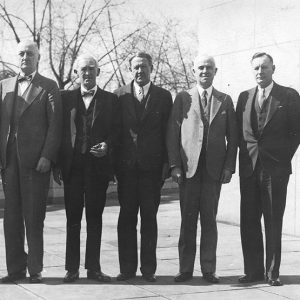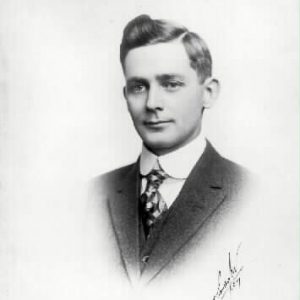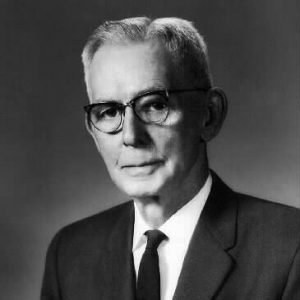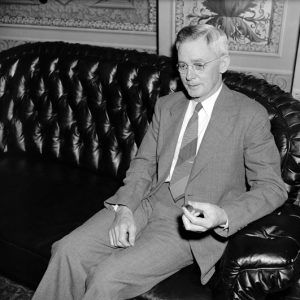calsfoundation@cals.org
John Elvis Miller (1888–1981)
John Elvis Miller, the son of a Confederate veteran, had a distinguished career in the law, sandwiched around a political career that took him to the U.S. Senate in one of the most startling Arkansas elections of the twentieth century. He was a prosecuting attorney, a congressman, and a senator, resigning the last position in 1941 when President Franklin Roosevelt appointed him U.S. judge for the Western District of Arkansas.
John E. Miller was born on May 15, 1888, in Stoddard County, Missouri, the son of John A. and Mary Harper Miller. As a child, he helped his parents and seven siblings raise cotton and corn on their Missouri bootheel farm. When he finished the ninth grade, he took an exam and began to teach elementary school while he attended high school. He taught school in southeastern Oklahoma and then returned to Missouri to teach and to be principal of a three-room school. In the summer of 1909, he sat in on trials while working as a deputy revenue commissioner. Then, with his savings from teaching, he quit three weeks into the fall term of school and went to Indiana to study law at Valparaiso University and the University of Kentucky at Lexington, where he received a bachelor of law degree in 1912. He decided to move to Arkansas to practice law, and on a train ride, he met a Batesville (Independence County) lawyer who suggested that he go to Searcy (White County). He began practicing law that year in Searcy as a partner of J. N. Rachel at a salary of fifty dollars a month. Miller became the Searcy city attorney in 1913 and then opened his own law practice in 1918. In October 1914, he married Ethel Lucile Lindsey of Lee County, and they had two children, Mary Louise and John E. Miller Jr. Ethel Miller died in April 1955, and in December 1956, he married Ethel Skinner of Fort Smith (Sebastian County).
He was a delegate to the Constitutional Convention of 1917–18, which drafted a new state constitution. Voters defeated the charter on December 14, 1918.
Miller was elected prosecuting attorney for five east-central Arkansas counties in 1918 and, the next year, prosecuted twelve African Americans accused of involvement in the Elaine Massacre of that year. Although Miller prosecuted the twelve men and scores of others who were rounded up during the massacre—in what most people today would call summary trials—and advanced the story that the men intended to massacre white landowners, he would drastically alter his account in an oral history fifty-seven years later with a history professor at the University of Arkansas. Miller expressed sympathy for the economic grievances of African Americans in the community and said the federal troops brought to the community on a train by Governor Charles Brough, although unprovoked, had gunned down scores of Black people who had expected the soldiers to be their protectors.
The U.S. Supreme Court overturned the convictions in 1923 in a famous precedent, Moore v. Dempsey. The cases dragged on until January 1925, when Governor Thomas C. McRae gave indefinite furloughs from prison to the last six defendants. He would later say that his experiences as a prosecutor shaped his notions about jurisprudence the rest of his life. He recalled that every county had its own ideas about what practices were wrong. For example, when he summoned a grand jury in Helena (Phillips County) to investigate cockfighting and betting on horse races, the foreman told him that those things were part of their way of life and that they would determine what offenses needed to be prosecuted.
In 1930, Miller, a Democrat, was elected to the House of Representatives from the Second Congressional District. Voters reelected him three times. After Miller began his fourth term in 1937, Joseph Taylor Robinson of Arkansas, the majority leader of the U.S. Senate, died on July 14, just as Roosevelt was about to appoint him to the U.S. Supreme Court. Governor Carl E. Bailey called a special election to fill the rest of Robinson’s term. The Democratic State Committee, controlled by Bailey, nominated the governor as the Democratic candidate.
Democrats who were angry that the central committee had nominated the governor called a rump convention at the Marion Hotel in Little Rock (Pulaski County) to nominate an independent candidate. When U.S. Representative John L. McClellan of Malvern (Hot Spring County) suddenly backed out as the candidate before the convention, a friend of Miller’s sent his aide in Washington DC to the Chesapeake Bay during the night to find Miller, who was fishing, and have him fly to Little Rock. The next day, Miller lobbied delegates secretly from a room at the Grady Manning Hotel and won the convention’s nomination. He soon defeated Bailey with sixty-one percent of the vote.
Miller’s election, as an independent, was the first defeat of a Democratic candidate for state or federal office in an Arkansas race since Reconstruction. It was a blow to Roosevelt, who was trying to shore up support for the New Deal among Southern senators and whose officials had supported Bailey in the election. Bailey had campaigned as a supporter of Roosevelt and his programs, including his efforts to pack the Supreme Court with justices who would give the Constitution a more liberal construction. Miller opposed the court-packing strategy as a member of the House Judiciary Committee.
The next year, voters approved an amendment to the state constitution that allowed governors to fill vacancies in the Senate and most elected offices by appointment but barred him from appointing himself or his wife and barred the appointee from running for a full term afterward. The amendment also created a run-off in party primaries when no one received a majority of votes.
Despite their coolness over the 1937 election and Miller’s frequent disagreements with the president on state issues, Miller and Roosevelt were friends, and he often dined with the president at the White House. Roosevelt appointed Miller to a federal judgeship for the Western District of Arkansas in 1941. Miller served in the position until 1979, when he was ninety-one. He was one of the oldest practicing federal judges in history.
Miller presided over three far-reaching cases, including Aaron v. Cooper, the Little Rock school desegregation case. In 1956, he dismissed a petition by the Little Rock branch of the National Association for the Advancement of Colored People (NAACP) to order full integration of Little Rock schools, upholding the gradual desegregation plan drafted by Little Rock school Superintendent Virgil T. Blossom. But he kept jurisdiction so the court would see that desegregation was carried out.
In what became known as the GI Revolt, in 1946, in a lawsuit brought by supporters of Sid McMath, Judge Miller ruled that 1,607 poll tax receipts in Garland County, nearly one-fourth of the potential vote, were fraudulent, which enabled McMath to be elected prosecuting attorney against the political machine of Leo McLaughlin. McMath was elected governor two years later.
In 1968, Miller put into federal receivership a hybrid savings and loan company called Arkansas Loan and Thrift, which had thrived under the regulatory agencies of Governor Orval Faubus. The resulting scandal produced criminal charges against the attorney general, Bruce Bennett, and resulted in the convictions of three company officials. It helped sully Faubus’s reputation and damaged his chances at future election.
Miller died on January 30, 1981, in Fort Smith. He is buried in Forest Park Cemetery.
For additional information:
John Elvis Miller Papers. Special Collections. University of Arkansas Libraries, Fayetteville, Arkansas.
Ledbetter, Calvin R., Jr. “The Special Senatorial Election of 1937 and Its Legacy for Arkansas Politics.” Arkansas Historical Quarterly 63 (Spring 2004): 2–23.
Stockley, Grif, Brian K. Mitchell, and Guy Lancaster. Blood in Their Eyes: The Elaine Massacre of 1919. Rev. ed. Fayetteville: University of Arkansas Press, 2020.
Ernest Dumas
Little Rock, Arkansas
 Divergent Prosperity and the Arc of Reform, 1968–2022
Divergent Prosperity and the Arc of Reform, 1968–2022 Early Twentieth Century, 1901 through 1940
Early Twentieth Century, 1901 through 1940 Politics and Government
Politics and Government Congressional Delegation, 1934
Congressional Delegation, 1934  John Miller
John Miller  John Miller
John Miller  John Miller
John Miller 



Judge Miller was a multitasker before the word was popular. He often worked weekends, including Sundays. He personally reviewed every paper filed in every case assigned to him as soon as it was filed in all the divisions of the U.S. District Court for the Western District of Arkansas. He was an expert on the federal rules of civil procedure. He had the rare distinction of being cited in the gold standard of texts–Moore’s Federal Practice–more than any other federal district judge in the country. Judge Miller at one time had the second-most-up-to-date docket in the entire federal court system. He was also a person of great common sense who who could reduce what appeared to be a very complex matter to one that could be easily understood. He presided over his courtroom without having to use his gavel by the sheer force of his personality and the respect of the attorneys who practiced in his court. He was very concerned about the taxpayers and would routinely spend less than the funds allotted to run his office. He often answered his own telephone so his one secretary would not be interrupted when doing his dictation. —Charles R. Ledbetter, law clerk for Judge John E. Miller, 1963-1965